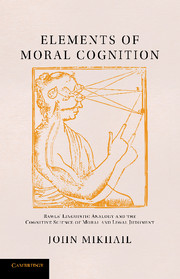 Elements of Moral Cognition
Elements of Moral Cognition Appendix: Six Trolley Problem Experiments
Published online by Cambridge University Press: 07 September 2011
Summary
This appendix describes six of the original trolley problem experiments that my colleagues Cristina Sorrentino and Elizabeth Spelke and I conducted from 1995 to 1999, when I was a visiting graduate student, research affiliate, and lecturer in the Department of Brain and Cognitive Sciences at the Massachusetts Institute of Technology. Our findings were first presented at the Cognitive Science Society in 1998, the Society for Research in Child Development in 1999 and 2001, and various department seminars and colloquia from 1998 to 2002. The experiments were initially summarized in a 92-page manuscript, Aspects of the Theory of Moral Cognition: Investigating Intuitive Knowledge of the Prohibition of Intentional Battery, the Rescue Principle, the First Principle of Practical Reason, and the Principle of Double Effect, which I wrote in the spring of 2002 as part of my J.D. thesis at Stanford Law School, under the direction of Professors Tom Grey and Mark Kelman. A revised and expanded version, Aspects of the Theory of Moral Cognition: Investigating Intuitive Knowledge of the Prohibition of Intentional Battery and the Principle of Double Effect, Georgetown University Law Center Public Law & Legal Theory Working Paper No. 762385 (Mikhail 2002a), was published on the Social Science Research Network (SSRN) in July 2005 and is available for download at the following web site: http://papers.ssrn.com/abstract=762385. Both manuscripts have circulated for many years and have been assigned in graduate seminars at leading research universities.
- Type
- Chapter
- Information
- Elements of Moral CognitionRawls' Linguistic Analogy and the Cognitive Science of Moral and Legal Judgment, pp. 319 - 360Publisher: Cambridge University PressPrint publication year: 2011


